#The Zürau Aphorisms
Quote
There are two main human sins from which all the others derive: impatience and indolence.
Franz Kafka, The Zürau Aphorisms
#philosophy#quotes#Franz Kafka#The Zürau Aphorisms#impatience#indolence#laziness#sloth#vice#ethics#morality#humanity
265 notes
·
View notes
Text
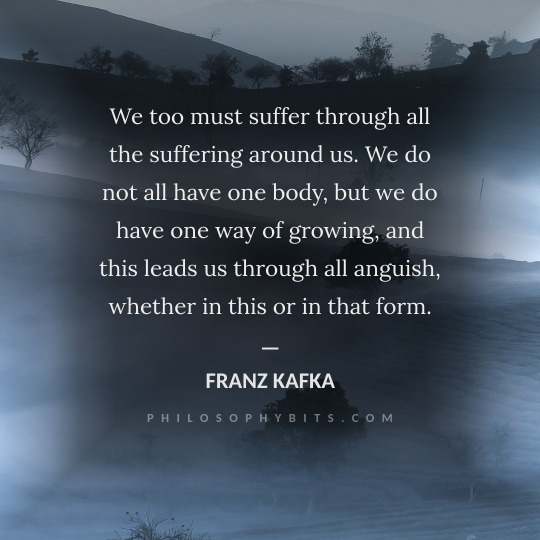
13 notes
·
View notes
Text
You do not need to leave your room. Remain sitting at your table and listen. Do not even listen, simply wait, be quiet, still and solitary. The world will freely offer itself to you to be unmasked, it has no choice, it will roll in ecstasy at your feet.
Franz Kafka, The Zürau Aphorisms
10 notes
·
View notes
Text
Q: Hank, were you as afraid of your father as Kafka was?
A: At the age of 36 or so, which is when Kafka wrote Brief an der Vater? In 2016? I was sending my dad 'fuck you!' emails and demanding he not spank his grandkids.
I also wasn't still dependent on him, afraid to upset ole moneybags like Kafka was.... tho, like Kafka, I certainly blame the old man in equal measure for my failings in life. I never overtly blamed the old man for loss of romantic partners on the outside, but I do blame daddy and society as a whole for that to some extent on the inside, you betcha I have for quite some time now. I'm not dumb and I know their effects on gay men en masse and on me in particular. There's just more immediate and (to me) important concerns, since I'm not exactly of the mindset that I even want a partner.
Perhaps I'm wrong and the partner is the most important thing, and without one I'll be... shall we say... unwell, in a relative sense, compared to the herd.
I was quite brave and impudent to my dad's face compared to Kafka at the same age, and even far earlier, going back to many points in life where I decided fuck that fuqqing fuq, I'm out of here and not talking to the bastard.
Still, let's be fair... let's not just position Kafka as proto-emo and a whiner who wanted ole moneybags' financial resources while not wanting to offend while also blaming the guy for every weakness in his own life, as he did.
Kafka's dad, while as irrational and full of toxic masculinity and pigheadness as mine, was much more of a world-conquerer and bold and stentorian individual, it seems, more competent and a real self-made man... a source of source of prowess and conquistador energy. My dad was no such thing, more of an entitled loser with some farmboy money and farmboy support.
Kafka's dad would have been more intimidating than mine. Mine's quite easy for the local women to laugh at, and I had a divorce in the family to psychologically help out with defiance and rebellion.
Kafka's predicament was more akin to my dad's predicament, in a way, and had my dad been a great writer, it probably might have come out more like Kafka.
My dad's more the sort of guy who would say with anger and disgust, out of the blue, that 'you should have written a book by now'.
I think he said that in my late 20s already. All I could think was fuck you, is that supposed to be motivational? I don't take orders from you, asshole, and I'm not writing any fucking book if you're going to talk to me that way.
I am not some piece of shit who failed to generate a book.
I am not a toy manufacturer.
These dumbasses really don't get it. I'm not your cow. You're not going to shame me into milk production, you spoiled rotten fuckfaces with the facial expressions that -- I will not say, because I care about people with -- anyhow, I'm not going to go there, but that's what's almost going on and may be going on, but certainly glugging down all that alcohol and being a fucking LAZE at 100 times the extent of my laze is what caused that. Cognitively deciding that work is for suckers caused that. It's the ole Asian proverb about how the man who wants an easy life will have a hard life.
Anyhow, Kafka's father didn't understand writing. Mine maybe just saw A BOOK as money/profits and probably did. I guess it's similar, even though mine was technically pro-book. For certainly, my father gives zero flying fucks about anything I ever have written, so I guess that's the truth.
"$ and Power, GET IT YOU PIECE OF SHIT!" - my dad
"$ and Power, GET IT YOU PIECE OF SHIT!" - Kafka's dad
What if we don't want to, though?
And what if Kafka was too much of a coward to leave daddy's lap and stand up to the sonofabitch
And what if I were brave enough to go move far away and stand up to the sonofabitch many times, though not nearly as much as I wish I would have (and that opportunity still remains, if one wants to call defiance an opportunity -- and who knows if I'll take it when there's also the opportunitah to vacation in Defiance, Ohio instead)
And what if the patriarchy didn't give a shit one way or the other and is just gonna do what it does with no opportunity for resource or appeal, like in Kafka's The Castle?
And what if I were more courageous and lived a more enchanted and positive life than Kafka all over the world, despite my negativity
And what if Kafka wrote the enduring literature, trapped in rabbit hutch Prague and scribbling the fancy fancy and the groundbreaking, closer to the canonical sources of literary power and prowess and Jewish tradition, as he was -- the Zürau aphorisms probably being the most pristine and powerful of Kafka's work, in my opinion --
And what if what?
Disney recently attempted to fix both of our situations for us in Strange World, as well as fix things for blacks and women.
However, it comes too late for me and too late for Kafka.
So how now, white cow?
What now? Who and what part am I supposed to jizz onto?
Who and what part am I to write about and for what purpose and what style?
I don't fucking know. How would I know that?
How would I know anything? I'm from a cow town and choose not to be a cow, but to absolutely not be a cow, you should know where you're going to. How would I know that?
Well, I know the where, I guess, but not what to do there yet. One step at a time, even at this late age, eh?
Kafka was dead at 40. It wasn't his fault, it was tuberculosis.
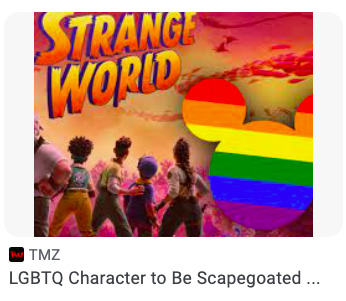
#mommie queerest#franz kafka#the castle#the trial#the zürau aphorisms#strange world#patriarchy#abusive fathers#dumbass fathers
0 notes
Text
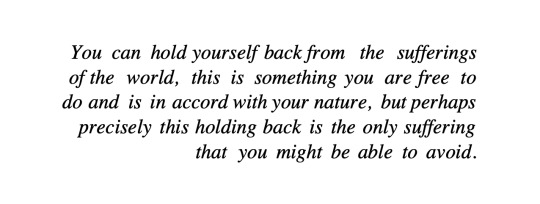
Franz Kafka, The Zürau Aphorisms
136 notes
·
View notes
Text
We too must suffer all the suffering around us. We all have not one body, but we have one way of growing, and this leads us through all anguish, whether in this or in that form. Just as the child develops through all the stages of life right into old age and to death (and fundamentally to the earlier stage the later one seems out of reach, in relation both to desire and to fear), so also do we develop (no less deeply bound up with mankind than with ourselves) through all the sufferings of this world. There is no room for justice in this context, but neither is there any room either for fear of suffering or for the interpretation of suffering as a merit.
– Franz Kafka, The Zürau Aphorisms
19 notes
·
View notes
Text
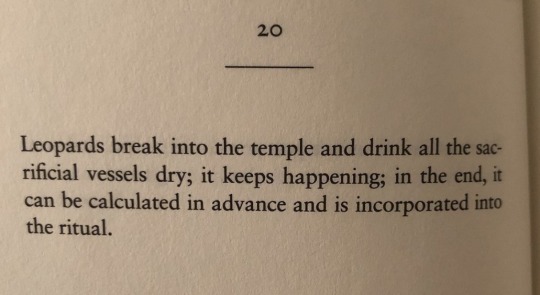
Franz Kafka: Aphorisms (The Zürau Aphorisms), which he wrote after being diagnosed with the illness that would kill him. Translated by Edwin and Willa Muir & Michael Hofmann, Schocken Books, 2015
6 notes
·
View notes
Text
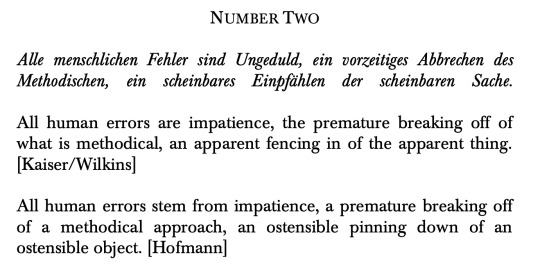
Kafka, Zürau Aphorisms
3 notes
·
View notes
Quote
Only our concept of time makes it possible for us to speak of the Day of the Judgment by that name; in reality it is a summary court in perpetual session.
The Zürau aphorisms, Franz Kafka
12 notes
·
View notes
Text

Kafka (tr. Michael Hoffmann), The Zürau Aphorisms/Reflections on Sin, Hope, Suffering, and the True Way § 16
7 notes
·
View notes
Text
My earliest reading memory
We had very few books at home, growing up, so I always looked forward to the Japanese textbooks that were handed out in school every term. I would read the entire book in one day, and over and over again after that. Textbooks might seem boring, but they gave me a way into contemporary poetry, haiku and tanka poems.
My favourite book growing up
Demian by Hermann Hesse. Of all the protagonists, Sinclair appealed to me because of his introspective nature and lack of confidence.
It surprised me that I could understand the essence of my own culture through the work of Vonnegut, an American writer
The book that changed me as a teenager
I was lucky to read Kurt Vonnegut as a teenager. Michael Ende has written about the way in which humour is not an expression of playfulness but rather an attitude of how a person deals with the extreme hardships and setbacks that occur in life. This understanding of humour is connected to the spirit of Osaka, the city where I was born and raised. It surprised me that I could understand the essence of my own culture through the work of Vonnegut, an American writer. Through his imagination and epic experiences, he taught me about hope amid despair.
The writer who changed my mind
James Joyce. He completely transformed the way I thought about poetry – the whole concept of it, from form to content.
The book that made me want to be a writerI can’t think of one, because I never aspired to become a writer. I just gave my all to every job and got to where I am now.
The book I came back to
Gravity and Grace by Simone Weil. As a non-believer, I could read and understand Weil’s work but never felt I could touch its essence. Now that I’m older and have been exposed to human limitations in various ways, the “God” that Weil refers to has taken on a new significance for me.
The book I reread
Growing Up (Takekurabe) by Ichiyō Higuchi, who was one of the first professional female writers in modern Japan. She depicts, in superb prose, the brilliant innocence of children and the customs of the old part of Tokyo, from 130 years ago. Aside from being a pleasure to read, the story reminds me of how the economic disparity and systemic inequality of her time remain unchanged today. The Zürau Aphorisms by Franz Kafka is another one.
The book I could never read again
I find many books are too macho to read now. Stories about “inheritance” or “succession”, depicting the conflict between sons and their oppressive fathers.
The book I discovered later in life
A Manual for Cleaning Women by Lucia Berlin. This short-story collection was translated into Japanese a few years ago. I’m amazed by her ability to write about life’s sorrows and disappointments.
The book I am currently reading
The Tale of Peter Rabbit and Other Stories by Beatrix Potter. I’m currently translating all 23 tales into Japanese, so I’ve been reading them very closely for the past two years. I am constantly impressed by their perfect structure – the illustrations are wonderful too. For example, the animals that eat well have shiny fur, whereas the less fortunate ones look greasy and flabby – their fur is painted differently according to class. There’s a lot I have learned from Potter’s life and her insightful vision.
My comfort read
Kafka, because his works contain the truth that despair is neither something to be detested and shunned nor a sudden misfortune, but a natural condition for human life.
1 note
·
View note
Text
The crows assert that a single crow could destroy the heavens. This is certainly true, but it proves nothing against the heavens, because heaven means precisely: the impossibility of crows.
Franz Kafka, The Zürau Aphorisms
1 note
·
View note
Text
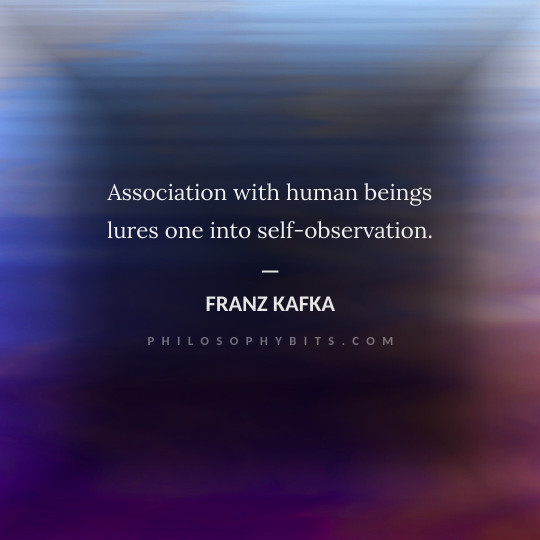
16 notes
·
View notes
Text
The Truth is indivisible, and therefore incapable of recognizing itself. Whatever claims to recognize the Truth must therefore be a Lie.
---- Franz Kafka, the Zürau Aphorisms
youtube
When Blood sees Blood of its own, it sings to see itself again.
It sings to hear the voice it's known.
It sings to recognize the face...
Give a man a mask to paint, to portray his enemy... and most men have a curious habit of producing a photocopy of their own faces, as others may see them.
They may be blind to this fact, the entire process... so focused on the details.
For some time, I have seen this as a celebration. I stop, look back, and fall in love.

youtube
Give a man a mask to paint, to resemble himself...
Who are you?

0 notes
Text
Impossibility of Crows-- A Replay
The crows like to insist that a single crow is enough to destroy heaven. This is without doubt, but it says nothing about heaven, because heaven is just another way of saying: the impossibility of crows.
–-Franz Kafka, The Zürau Aphorisms, #32
The Impossibility of Crows– Now at Principle Gallery
This morning, I am taking the unusual step of rerunning a blogpost that ran only six weeks ago. This…

View On WordPress
0 notes
Text
Há dois pecados humanos principais dos quais derivam todos os outros: a impaciência e a indolência.
— Franz Kafka, The Zürau Aphorisms.
0 notes